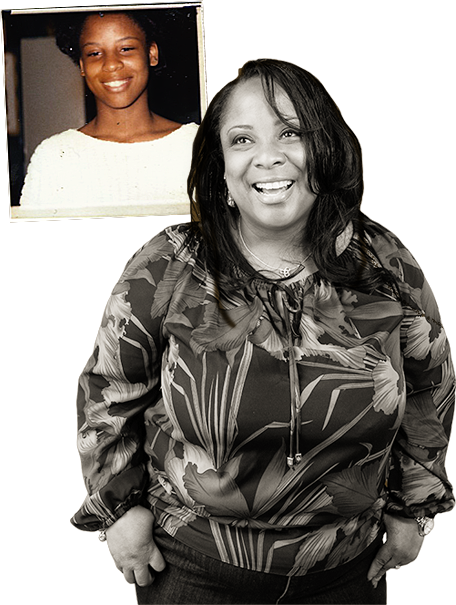
See additional footage of Domonique
See List of Dreamers
Domonique (Alford) Jenkins
I really think that the I Have a Dream program saved my life. The words "If you graduate from high school, he will pay for college"—that was hope. Because if it wasn't for that goal for me, I wouldn't be where I am now. I wouldn't have graduated from high school, because I wouldn't have cared. My mom couldn't afford to send me to college. And God only knows, after she started using, that dream really went out the window. Then here's this tall white man that doesn't know me, but all of the sudden he's going to pay for me and 66 of us others to go to school. That's a lot of people, and a lot of money. But I don’t think Mr. Bainum saw us like “these poor little…” you know. Not at all. I mean, I’m sure he had a love for us like we were a part of him and his own. He was heaven sent.
I won't say, necessarily, I wanted it more than anyone else—because I'm sure everyone else wanted to go to college, get a good job, start a family—but I wanted out. I made good grades; I was a smart kid. I just had a crappy home life. My parents started using crack when I was 11. My sister started first; she was pregnant with my niece. I mean, every day coming home, someone's getting high. Surrounded by gun shots and drugs and violence and sex that I shouldn't have been seeing. I mean, I could look at a gun then and tell you how many rounds it had. And I think they really felt for me, Mrs. Rumbarger and Mr. Bumbaugh. They were my advocates: Look, this kid needs help.
When I finished Hart Junior High—because I had left Kramer—I was like, I’m not going to Ballou. Hart was the feeder school for Ballou, and at that time, it was crazy. All of the girls were pregnant. The boys were getting shot over coats, tennis shoes—drug dealers. I just didn’t need that environment, knowing that I had a I Have a Dream scholarship on the line. So I took the PSAT, and I was able to get into Edmund Burke. Mr. Bainum paid for me to go to private school.
But that October, I was admitted to the hospital, DC General, with an itchy hive rash and pains in my legs. They kind of looked at me like: You’re not going to be able to go home. I was in the hospital for 11 days. It was what the doctor suspected: I had lupus. After I got out, I went back to Burke, and I tried to keep up. I’d missed two weeks of school. Even though I had friends, they were busy doing piano lessons, guitar lessons, soccer, you name it. No one brought me work. Here I am, the little girl from Southeast. And it was just devastating for me, because it was already difficult from the start. I was already behind. So I’m trying to play catch up, and it was just too much.
My last official day at Edmund Burke was my birthday, March 5th. Mr. Bumbaugh helped me leave Burke and enroll at Ballou. It didn’t feel comfortable. I played hooky a lot, because I was bored. What they were doing in March, April, I did in October. So, it wasn’t a challenge. I mean, I would go every day, but I would just leave at lunch, you know, go get my hair done, go get my nails done. At the time, I was 16, my boyfriend was 24. There were parts of him that were bad for me. But he did look out for me. He made sure that no one bothered me. He made sure that my niece and I had meals. I didn’t have to want for anything, because he would have made sure I had it.
Mr. Bumbaugh would come by the school or come by my house and see how I was doing, but my parents, they didn’t care, they were on drugs at that time. So, it wasn’t a constant, everyday presence of someone to say, “Oh, you skipped school today? You’re in trouble.” I mean, they were loving parents. They just had a really bad way of showing it!
The plan was for me to only go to Ballou to finish the school year, and then to go to Mount Vernon in the fall. So I told my parents, “I’m going to Ohio.” Dad was really strict, he was like, “No, you’re not.” Hmm: Watch. I packed my stuff. Every day something else was gone until I got everything that I cared about that I could take—and Mrs. Rumbarger came and got the boxes and shipped them to Ohio. Then I was like, “I’m leaving. This is going to be good for me. You guys do you, I’m going to do me.” And you know, at that point, my parents were like, “Oh, whatever.” So I left. I mean, I had no choice. I was taking care of myself, basically, anyway.
It was hard, because I didn’t want to leave my niece behind. She was four. But it was put to me that in order to help her, you have to help you first. And that’s a hard lesson for many people—caregivers—to learn; I’m still trying to learn it! Looking back on it, Mrs. Rumbarger and Mr. Bumbaugh and my mentor, I think they triple-teamed me. You know, This would be really good for you, and Just think of what you’ll be able to accomplish if you do. The choice ultimately was my own. But, yeah, it was hard, I cried all the time, all the time. And the only thing that kept me going was, I got to do this for my niece. I got to make it so she can make it.
Did two years at Mount Vernon Academy. It was quite an experience—big adaptment. Some of the kids thought we got special treatment. We didn’t—but we were unique. Because we were like brothers and sisters. When we were sad or homesick, we were there for one another. I mean, we were all we had while we were there. When we were looking for colleges, Mrs. Rumbarger rented a van and took us all on a college tour trip. It was awesome. My top choice was Baldwin-Wallace. And I got my acceptance letter around the time of my birthday. I was so elated. So, that fall, Mrs. Rumbarger drove me to Baldwin-Wallace. Kissed me goodbye, and told me, "Have a great year." In my blue dress with my white collar. And then, when I graduated, in June of '98, my mentor came, Mrs. Rumbarger came, and my mom. It was awesome. The three most important women. And they were so proud of me. I had a diploma, finally, and it said "college."
A lot of what I went through has definitely governed how I run my life now. I’ve made sure that my kids understand the importance of school. That’s a non-negotiable. Good grades are a non-negotiable. No C’s in this house. I make sure that they are world-cultured. You do what you have to do to make sure your children succeed. Now, they don’t have the mentors that I had. They don’t have Mr. Bainum, they don’t have Mrs. Rumbarger. Well, they do, kind of, sort of. My name for her is "Mom Two." And for my kids, she's like "Grandma Two." She took a special interest in me. And I loved her right back for it. Mr. Bumbaugh, the same thing.
I think, without the entities that I had—"I Have a Dream," Mrs. Rumbarger, my mentor, Katherine Klein—I wouldn't have gone to school. I would have never went to Edmund Burke, which would have not exposed me to that college preparatory life, to say, when I got to Ballou: Oh, this isn't normal, I got to get out here. To then go to Mt. Vernon and still want more and go forward. It provided me with hope. And the opportunities through that hope just kept me holding on, that it's going to get better, it's going to get better, it's going to get better. Without that, I could have had a child really young. I could have been with the boyfriend, still, that was selling drugs, maybe even murdered, just because I was with him. I mean, he was tortured and killed. May his soul rest in peace. All those things could have happened to me.
So, even though I think, in my hearts of hearts, my story is unique, deep down it really isn't. We all had our own reasons that we needed to get away from whatever situation. Maybe someone's mom was an alcoholic. During that time, drugs were heavy. The crack epidemic was crazy. Many of us didn't have a mom. Many of us didn't have a dad. And even if Mom and Dad were physically there, half the time, they weren't there mentally. Stepping over drug addicts in your home, or having to walk really fast past someone, because you're afraid that they might snatch you up and rape you.
Granted, the program can't do it all, and no, you can’t save them all. Me, I’d like to think you can. But you do what you can. I think some of the other Dreamers may have had the chances I had if they had a mentor like mine, that cared and that was dedicated to stick it out. I mean, she's been one of the ones within that circle that made sure I had clothes. That made sure I had food. She paid for my wedding. She’s been like a mom. Or if they had more attention or more of a bond or more of a connection with Mrs. Rumbarger and Mr. Bumbaugh. Some individual to care enough to make sure that they went to school, to make sure that they celebrate the little things. Some type of force to let them know that they’re not in it alone.



